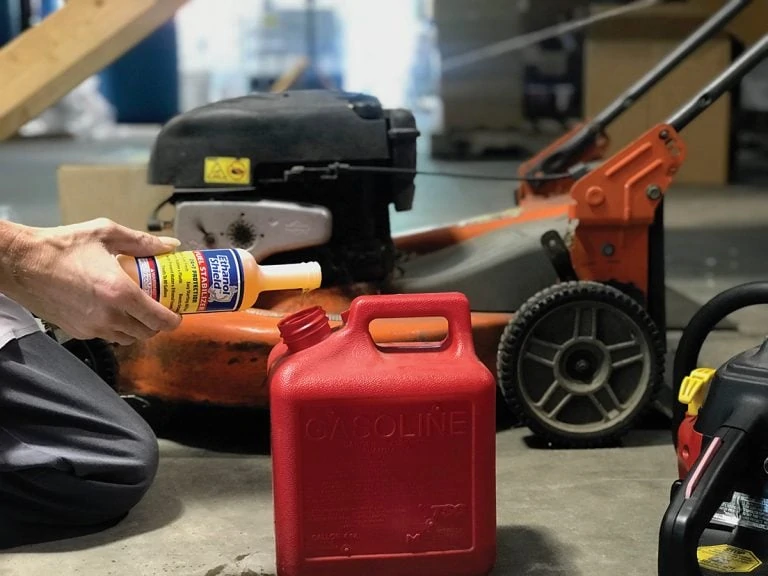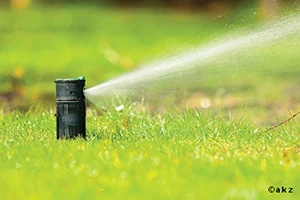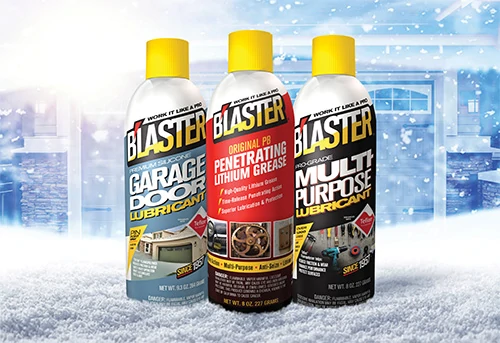One common task to protect gas-fired outdoor power equipment is prepping the fuel systems of the engines. Although some manufacturers recommend draining the fuel tank and carburetor prior to storage, doing so might make it more difficult to start when you take it out of storage. The fuel system must be addressed, however, because alcohol-blended fuels can attract moisture that leads to separation and formation of acids during storage. Acidic gas can damage the fuel system of an engine while in storage. Moisture can trigger corrosion in the tank, fuel lines, carburetor and cylinders.
This true for lawnmowers, blowers, chainsaws and other gas-powered equipment. The problems arise in part because it’s nearly impossible to get every drop of fuel out of the system, and when oxygen attacks, the remaining fuel droplets can create a gummy residue that clogs parts of the carburetor, which prevents the engine from starting and requires cleaning the carburetor. Fuel system plastics and rubbers are designed to live in fuel, and these components can become brittle and crack when exposed to air.
To avoid damage to the system, use a quality fuel stabilizer and fresh fuel before putting equipment way for the season. Adding fuel stabilizer to old fuel will stop it from degrading further, but the fuel may already have broken down (gas lasts only a few months before going bad). To store for winter, fill your tank 95 percent full with fresh, stabilized fuel. This leaves a little room to prevent the fuel from expanding and spilling in warm weather, but reduces the risk of water vapor that can condense and contaminate the fuel.
After adding the fuel stabilizer, run the engine for a couple of minutes to circulate the stabilized fuel into the carburetor and fuel lines. That’s all it takes to winterize your power equipment’s fuel system.
In addition to prepping the fuel system for your outdoor power equipment, clean the housing and engine thoroughly, remove all dirt, grease, leaves, etc. that can contribute to rust. Lubricate all moving parts. Inspect moving parts for damage, breakage and wear. Replace if necessary.
For lawnmowers, clean the underside of your lawn mower by scraping off build-up of grass and trash. This chore should be done after each mowing, but most definitely before winter storage. Keep finished surfaces/wheels free of gasoline, oil, etc.
Clean the engine often to keep trash from accumulating. A clogged engine runs hotter and shortens engine life. However, avoid using a garden hose to clean equipment unless the electrical system, muffler, air filter and carburetor are covered to keep water out. Water in the engine can result in shortened engine life.
Replace the air filter every season, servicing it more often under dusty conditions. (To clean an air filter, remove its cover, carefully remove the cartridge, and gently tap it on a hard, flat surface.)
SPRINKLER SYSTEM
Prepare an in-ground sprinkler systems for the onset of freezing temperatures. Water remaining in the system may cause valves or other components to malfunction during spring and summer.
Turn off the timer to your irrigation controller to ensure the valves will not activate. (If you unplug or cut the power to your controller rather than only turning off the timer, you may need to reprogram it in the spring.) Close the main water valve to shut off the flow of water to the irrigation system. The main valve is often located outside, but may be inside the garage, depending on the system setup. Shutting off the main valve will prevent any flow of water and protect the system from freezing up. If your system does not have a main shutoff valve, you may consider purchasing one, as they are inexpensive to install and a great way to protect your investment.
If you live in colder regions, remove the water from pipes to keep them from freezing and bursting. There are several ways to drain pipes, including draining the valves manually and using compressed air to “blow out” the system. There can be some risk involved when using the “blow out” method, so wear eye protection or contact an irrigation system specialist beforehand.
Insulate any aboveground pipes, valves and backflow preventers. Wrap the valve in insulation (foam insulation tape and a plastic bag). Home supply stores sell self-sticking, foam-insulating tape and insulating tubes for this task.
Another option is installing wireless rain/freeze sensors. A sudden cold snap before the system is winterized cannot result in damage and wasted water. A rain/freeze sensor connects to most irrigation controllers, and overrides the watering schedule when it detects rain or freezing temperatures. Once conditions improve, the system will return to normal operation.
Even if temperatures don’t drop below freezing during the winter, it is important that homeowners reduce the watering times and frequency during cooler temperatures. Most plants and grasses adapt to cooler temperatures and shorter days by curtailing growth, or going dormant during the winter. Scaling back watering will result in happier, healthier plants when spring arrives.
Side Note
B’Lasterize Your Equipment For Winter
As the cold-weather season approaches, it’s natural to start prepping your winter equipment for use, but we often forget about winterizing our spring and fall equipment. Well take our advice and don’t forget about it. You won’t regret taking the time to winterize your equipment for seasonal storage. Your garage door, lawn and garden equipment, outdoor power tools, hand tools and even your car will benefit from a few simple tasks. You’ll thank us come springtime.
B’laster makes several products that help prepare your equipment for winter storage. A few must-haves for around the house are as follows:
B’LASTER PREMIUM SILICONE GARAGE DOOR LUBRICANT
If not only to save yourself the headache of a squeaking garage door, but properly winterizing your garage door will save you time and money. Spray B’laster Garage Door Lubricant on all garage door mechanisms including the tracks, rollers and springs. It provides long-lasting protection even in cold weather. Bonus: If you have a rubber seal where the door meets the floor, apply it to the seal so it won’t stick to your garage door floor.
B’LASTER PENETRATING LITHIUM GREASE
This is a new product that combines the penetrating power of the Original PB B’laster with a high-quality lithium grease. That means that it will won’t run off the applied surface. The grease will stay put providing superior protection, while the PB wicks it way in and around tight crevices to free up any rust or corrosion. It’s the perfect choice for getting your trailer hitch ready for storage. Try it on the receiver and trailer tongue, and also on your car door hinges and hood latch. Bonus: Spray it on outdoor shed hinges, slides and pulleys.
B’LASTER PRO-GRADE MULTI-PURPOSE LUBRICANT
Probably the most versatile product for winterization is a high-quality general purpose lubricant. We recommend coating all metal parts and housings to repel condensation of the long winter to keep rust from forming. No joke, coat it all! Including engines, lawn and garden tools, hand tools, locks, bike chains, lawnmowers and so on. It will provide excellent corrosion protection all throughout the winter. Visit blastercorp.com.





